Most of the Portuguese train stations are adorned with tiles however this one is in a league of its own. Built at the beginning of the 20th century, the vestibule decorated with twenty thousand tiles painted by Jorge Colaço illustrates the transport evolution and events of Portuguese history and life.
The church of Santo Ildefonso is an eighteenth-century church, situated near Batalha Square.
The church, completed in 1739, it was built in a proto-Baroque style and features a retable by the Italian artist Nicolau Nasoni and a façade of tilework. The church, named in honour of the Visigoth, Ildephonsus of Toledo, bishop of Toledo from 657 until his death in 667.
The church of Santa Clara was part of the old convent with the same name, founded by D. João I, in 1416. at the request of the Franciscan nuns of the Poor Clares who wanted to replace the former monastery, from the XIII, for a smaller one
In its interior, we can find one of the best examples of the art of the gilded carving of the Baroque Joanino, that awes every visitor
Declared a UNESCO World Heritage Site the Church of São Francisco is located in the Historic Centre of the city. The simple gothic exterior deceives the lavish golden interior heavily decorated in gold leaf in the Baroque style, having been called the Golden Church
In 1809, when Napoleon’s troops passed through Porto. The French Cavalry officers decided that the Church of São Francisco would be an ideal stable for their horses.
Palácio da Bolsa is in the historical centre, near the Church of São Francisco. Once part of the 13th century São Francis Convent.
In 1832, during the Liberal Wars, the convent’s cloisters were destroyed by a fire. D. Maria II subsequently donated the charred land to the merchants of Porto, who built their stock exchange and commercial association there.
A construction that took almost 70 years to complete had six leading architects, dozens of master carvers, plasterers, painters, gilders, masons and hundreds of workers.
It is one of the most visited monuments in Porto, with the famous Arabian Room being its major highlight. The Palace’s lavish interiors served as a showroom to impress European investors.
With the implementation of the Republic, on October 5th, 1910, the Palace was vacated, and an existing painting of King D. Carlos I was vandalised with two gunshots.
Avoid the crowd – Palácio da Bolsa Guided Tour Ticket Here
The church and the Tower of the brotherhood of Clerics are part of a baroque-inspired building from the 18th century, by Nicolau Nasoni.
This beautiful and impressive Tower with more than 75m and 250 steps commands a breathtaking view and has stamped its mark in the history of the city.
Due to its height and locations, it was used, in the 19th century, to inform the inhabitants of the city that the Royal Mail Vessel was due to arrive. Two flags hoisted, meant that they would have two days to prepare their packages before the vessel’s arrival.
It also served as a clock. Every day at midday a flare would be set up from the tower and citizens would then be warned that it was midday and that it was time to close their businesses.
Ribeira is one of the oldest neighbourhoods of Porto and designated a UNESCO World Heritage Site.
The Ribeira is definitely, the place to visit in Porto. Just wander around the around Ribeira’s streets, packed with picturesque colourful houses and feel the lively atmosphere. These medieval houses still bubble with everyday life, flowers hanging from balconies, clothes drying, and neighbours greeting each other. Admire the old houses of Miragaia, very close to the Ribeira Quay, and visit the Casa do Infante.
Ribeira Quay can also be one of the best places in town to eat. Dining in traditional restaurants, with tables facing the river, is an excellent way to start the evening.
You can’t go to Porto and not taste the Port wine.
You can get a glass of Port wine at any number of restaurants in Porto, but the things to do in Porto is to cross the river to Gaia and visit the authentic Port wine cellars, Sandeman, Ramos Pinto and Ferreira, higher up, Graham. Learn how it is produced, aged and stored. Sample the wine and learn to differentiate them
It is said that the Port wine resulted from a happy coincidence. England was importing red wine from Portugal, and for it to survive the long journey north the wine producers decided to add to it “aguardent”, resulting in a smooth, sweet, and more substantial wine
Port is commonly served after meals as a dessert wine or as an apéritif.
The Rabelos boats used to bring the wine from the Douro valley to the cellars, now adorn the river banks and offer boat tours under Porto’s six bridges. Though touristy it is an enjoyable ride
Along the Vila Nova de Gaia Riverside, there is a cable car (Teleférico de Gaia) that transports visitors from the banks of the Douro up to the elegant, whitewashed Mosteiro da Serra do Pilar. From this unique circular cloister, there are unparalleled views across the Douro to the Ribeira and Porto landscape.
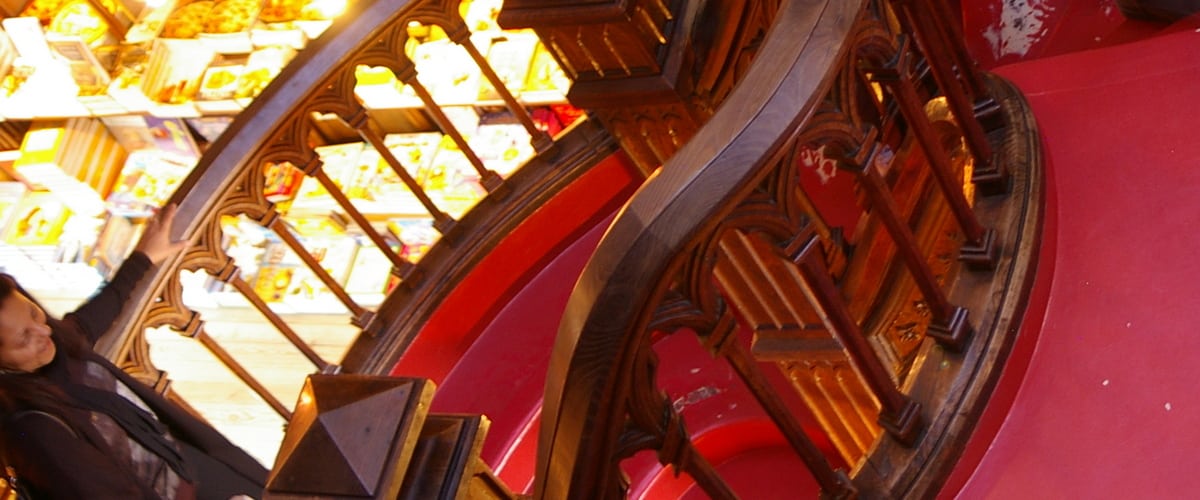
The 19th-century, wrought-iron market sells fresh produce throughout the year, and is by itself an icon
With two floors, this market is divided by areas: fishmongers, butchers, green grocers and florists. Come inside and be overwhelmed by the many sights, sounds, tastes and smells. Amuse yourself with the healthy banter between stalls, it will definitely enrich your vocabulary, specially in the fishmongers stalls
Opened : mon-fri 07:00-17:00 sat 07:00-13:00
Foz is where the city meets the Atlantic Ocean.
Tram 1 will take you to Foz do Douro – a former fisherman’s quarter but now the city’s most upmarket suburb. Arriving in Foz, enjoy the beach, stroll along the seafront or watch the sunset from one of many beach-level cafés.
Here you will also encounter the Castelo do Queijo, parks and gardens, the Pergola viewpoint and several surf schools where you can learn this sport or improve your technique
The Fundação Serralves administers the Museu de Arte Contemporânea designed by Porto’s Pritzker Prize awarded architect, Álvaro Siza Vieira. This museum offers various contemporary art exhibitions with a separate exhibition space in the Casa de Serralves.
The surrounding garden offers neat lawns, herbal gardens, gravel paths, outdoor art and outdoor Jazz concerts in summer. There is also a cafe, restaurant and museum shop, and a small farm.
Avoid the Crowd – Get your Ticket Here
The beautiful terraced slopes of the Douro valley, covered in vines, starts near Barqueiros, extending up to Barca de Alva. If the length of your stay permits it, one of the things to do in Porto is to catch the train or boat from Porto to the Douro valley, one of the most striking man-made rural landscapes.
The river Douro served as means of transport. The Rabelos boats would bring the barrels from the manor houses to the Cellars in Gaia. These barrels were never quite full, in case of an accident occurring with the boat, they would still remain afloat
Porto, like its wine, is better appreciated when you know its history.
During the Roman times, it was a port in between the route from Olisipo (Lisbon) to Bracara Augusta (Braga).
Having fallen under the rule of the Moors in 711, D. Afonso III, King of Asturias, Léon and Galicia, sent his men to conquer what was then known as the settlement of Portus Cale (now vila Nova de Gaia). It is said that the word Portugal is a deviation from Portus Cale. The land itself gave origin to Condado Portucalense, but that is another tale to be told when learning about Guimarães.
In 1387 Porto was the stage in which the marriage of D. João I and Philippa of Lancaster, daughter of John of Gaunt, took place. With it came the world’s oldest recorded military alliance between Portugal and England – The Treaty of Windsor. It was also from here that their son Infante D. Henrique set sail to conquer Ceuta initiating the Age of Discovery.
The nickname given to Porto’s inhabitants of tripeiros (Tripe) is because the best meat was packed into the seafaring vessels while the offcuts and byproducts as tripe were left behind for the citizens of Porto. A delicatessen still to be found in many typical restaurants.
By the 13th-century wine production in the Douro valley was already established. However, it was Marques de Pombal that defined how and limited the region on which it was permitted to produce port to ensure the wine’s quality. This was the first attempt to control wine quality and production in Europe.
In the 19th century, Napoleon troops invaded Porto to be ousted by the 1st Duke of Wellington. The Anglo-Portuguese Army crossed the Douro River from the Mosteiro da Serra do Pilar using wine barges to transport the troops, outflanking the French Army.
In the 19th century, Porto played a fundamental role in the war between Absolutists and Liberalists. D. Pedro IV and the faithful Liberalists of Porto won the siege of the Miguelist troops during the civil war of 1832-34. This feat earned the city, bestowed by D. Maria II the title of Invicta Cidade do Porto and D. Pedro IV post mortem literally gave it his heart, which is housed in the Church of Lapa.
The city’s name is Porto, however, in Portuguese, it is generally preceded by the article “O” (the). The English that settled there for the wine trade heard it as a single word and have from them on called it Oporto.
What leaves the biggest impression on a trip is the moments shared and the experiences undertaken. Make sure to book one of Porto’s many activities!
Enjoy Portugal with holiday-active.com and make the most of your holidays in Porto
What to visit in Porto, or should I say Oporto?
You may have read all the guide books to Porto but to get the true feeling of the city you visit you should book a tour with a local guide.
Who better to show you the hidden gems of the city, the best restaurants, the nooks and crannies only known to the few that live there? Book a tour and emerge yourself in the Portuguese way of life
What to visit in Porto, or should I say Oporto?
Cities that are bathed by the sea or the river have that special light and rhythm. Porto is fortunate to be bathed by both. Be sure to include a boat tour on your visit to Porto. If you have time, sail up the Douro, stopping at some wineries. More than the nectar of the gods, a divine experience
Discover Portugal with holiday-active.com and make the most of your holidays in Porto.
What to visit in Porto, or should I say Oporto
Make the most of your holiday in Portugal. Book your transport or skip the line at Porto’s most popular attractions by getting your online tickets here
What to visit in Porto, or should I say Oporto?
Porto is a city to be visited on foot. Its narrow streets, scarce or paid parking encourages the use of public transport. So, choosing a central accommodation or one close to public transport will do a lot for the success of your visit to this charismatic city.
Read our recommendations for the best places to stay in Porto and the attractions that each area offers and choose the one that bests suits you
An area that has undergone extensive urban rehabilitation, with a multiplicity of local accommodations and trendy hotels. It also offers the greatest variety of local restaurants.
A central area, close to the Torre dos Clérigos, S. Bento Station and the nightlife of the Galerias de Paris
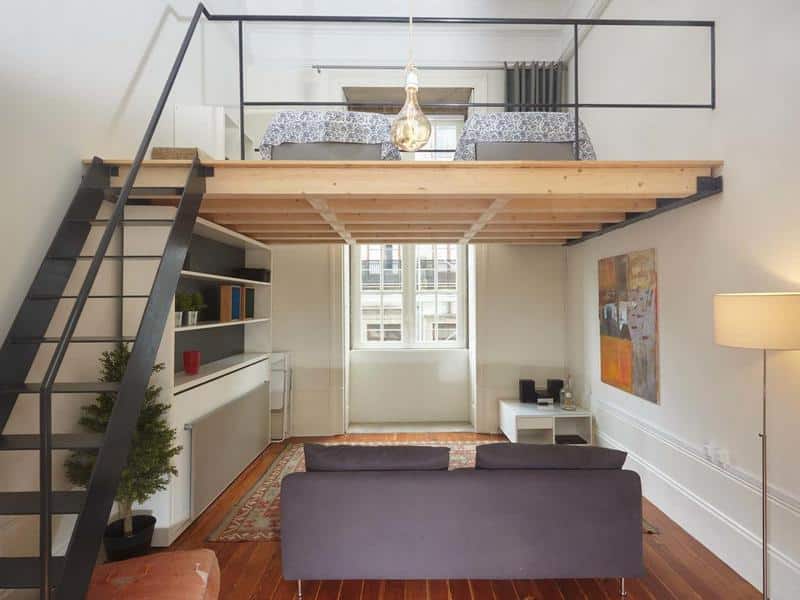
Passenger Hostel is located literally on the iconic São Bento Railway Station, offering private and shared accommodation, a bar, shared kitchen, and free Wi-Fi. Modern and comfortable atmosphere with unexpected spacious rooms
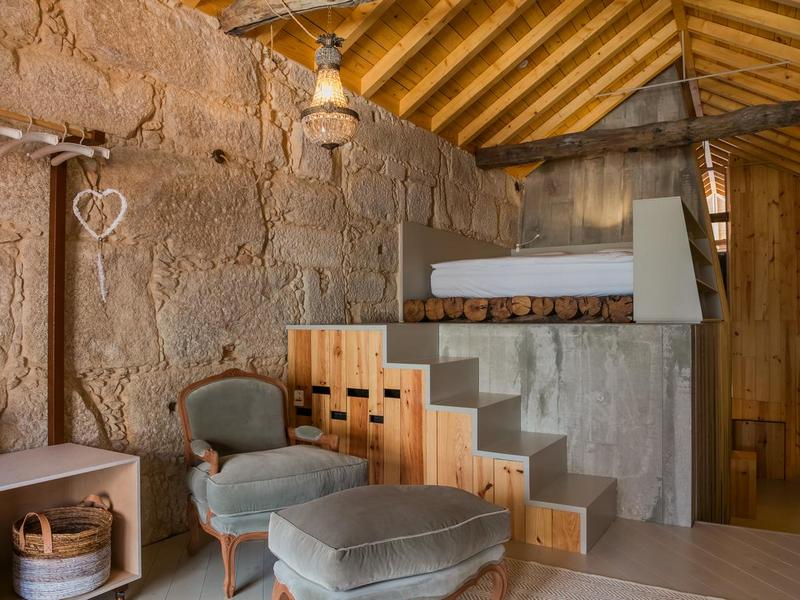
Established in an old iron warehouse from the 19th century, the Luxury Housing- Architectural & Design Hotel Store has kept its main elements: Iron, concrete, glass and wood. With 9 rooms and 3 apartments decorated with bold details, imaginative storage solutions and large windows overviewing the city
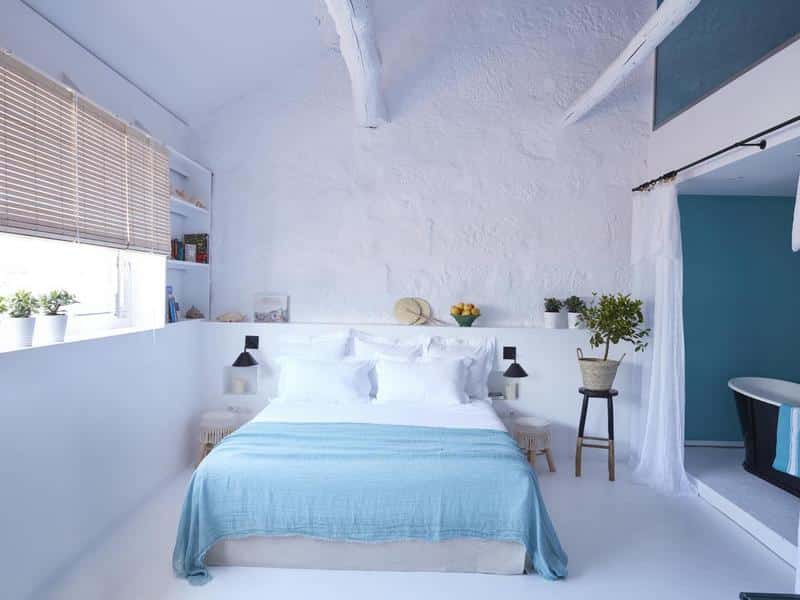
A romance between Portugal and France in both decoration and gastronomy. With 10 large rooms where the bathrooms gain a pre-eminent place. With an enticing outdoor patio and a casual-chic atmosphere
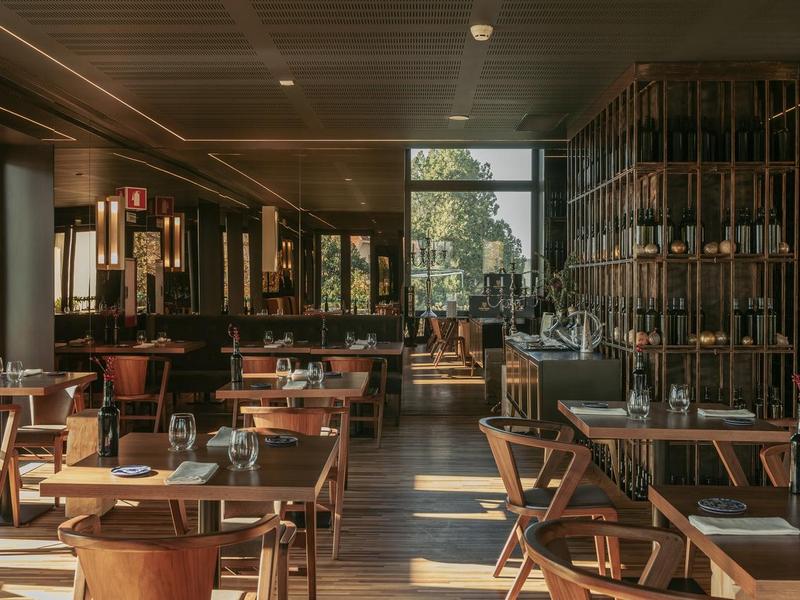
A 5-star hotel, awarded 3 times, with 47 rooms and suites. It offers an outdoor pool, a fitness centre and a garden with panoramic views over the city. A luxurious atmosphere enhanced with pieces of art
It is located within walking distance of the Jardins do Palácio de Cristal and the Livraria Lello
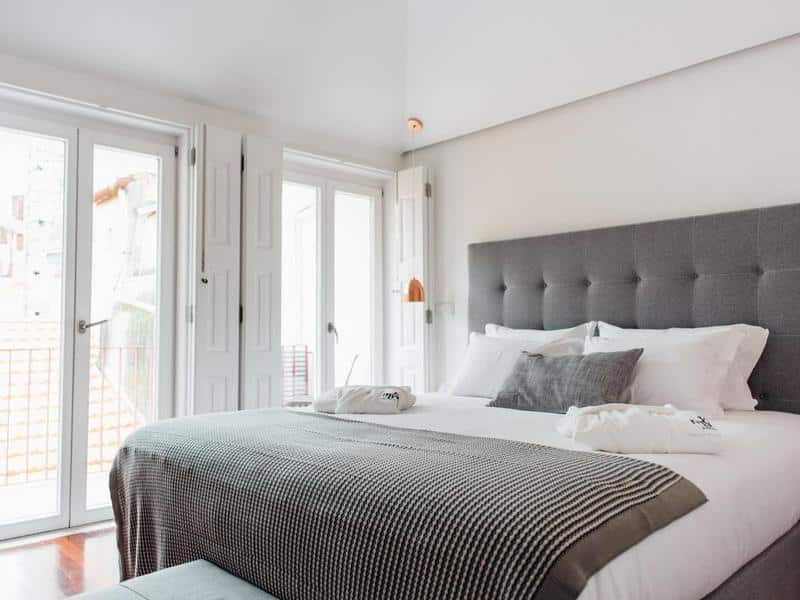
Situated in the glamourous and pedestrian Rua das Flores, the Myo Design House building was once the first large Hospital of Porto (1605). It has been beautifully refurbished, keeping its original façade, and now oozes charm, refinement and comfort that will make you feel at home
You may choose either the Terrace Studio, the superior suite, or the balcony suite
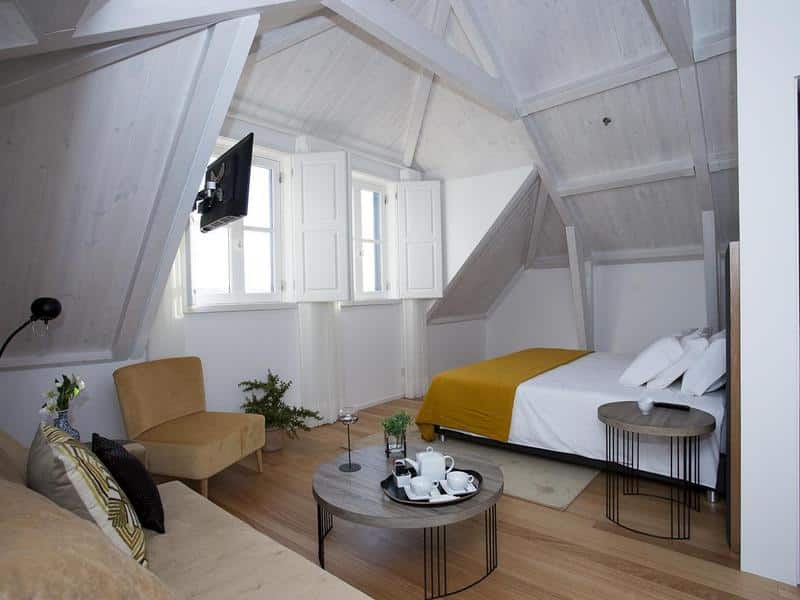
The building has been reformed with a creative flair which nevertheless respects the original character. All buildings have a private bathroom with either a river or city view.
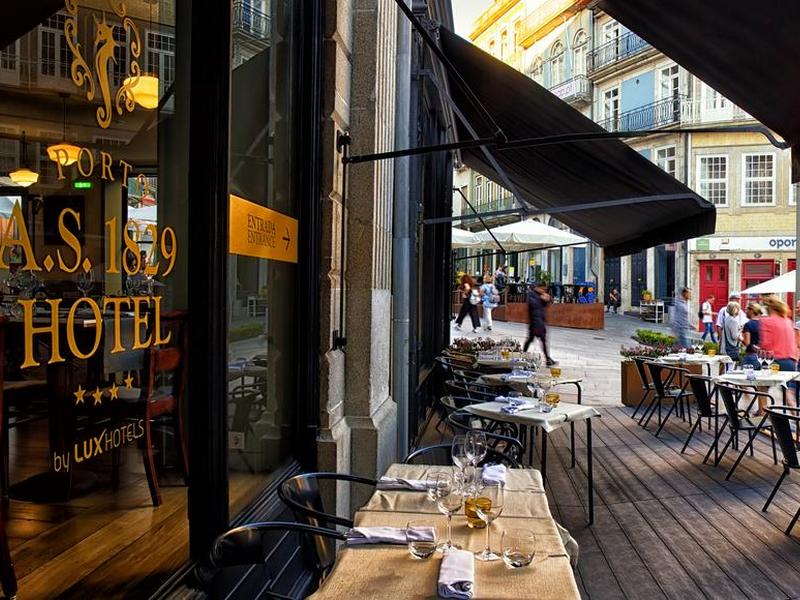
This boutique hotel is situated in the heart of Porto. Refurbished to accommodate ample rooms, all with a private bathroom and some including a classic bathtub in the room. It takes its name from Porto’s Araujo & Sobrinho print business and stationery shop, one of the oldest stationery shops in Europe (1829) an uses its artefacts as part of the hotels stylish design
Cedofeita is an area that has also undergone major renovations. A place of art galleries, nightlife, and a relaxed atmosphere.
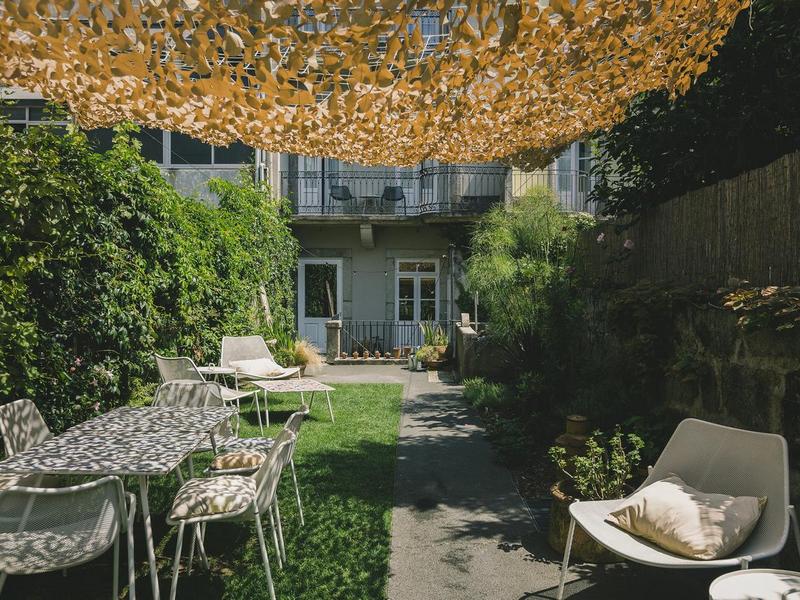
With only six elegant and spacious exclusive balcony suites, it feels more like home them a hotel. Spacious rooms, Spa bathrooms and top-notch service. It also has a coffee shop, restaurant a concept store, outdoor patios, and a kitchen’s garden.
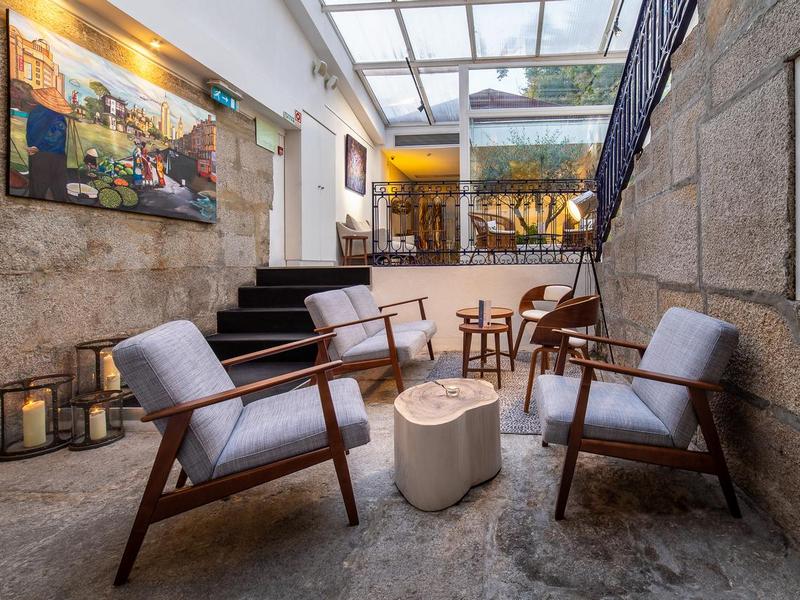
Provides modern private and shared rooms with a scenic city view. Some have seating area and balconies.
Excellent location and great atmosphere. Homemade breakfast, thematic dinners, wine tasting and drinks from the bar to be enjoyed on the terrace make your stay truly special
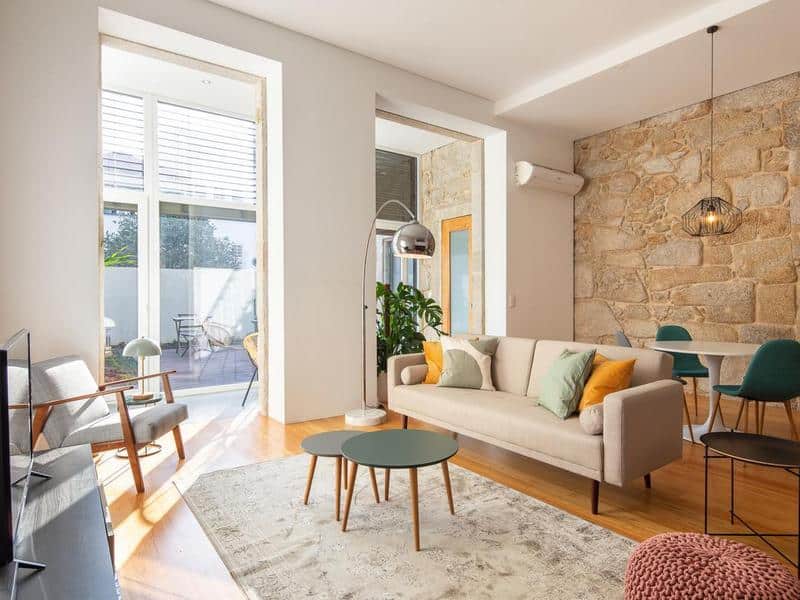
All rooms have a private bathroom, some with a small kitchenette where guests may cook simple meals.
Ribeira, for its river view, is one of the most coveted areas for those who visit this city. This area has also been renovated through local accommodation.
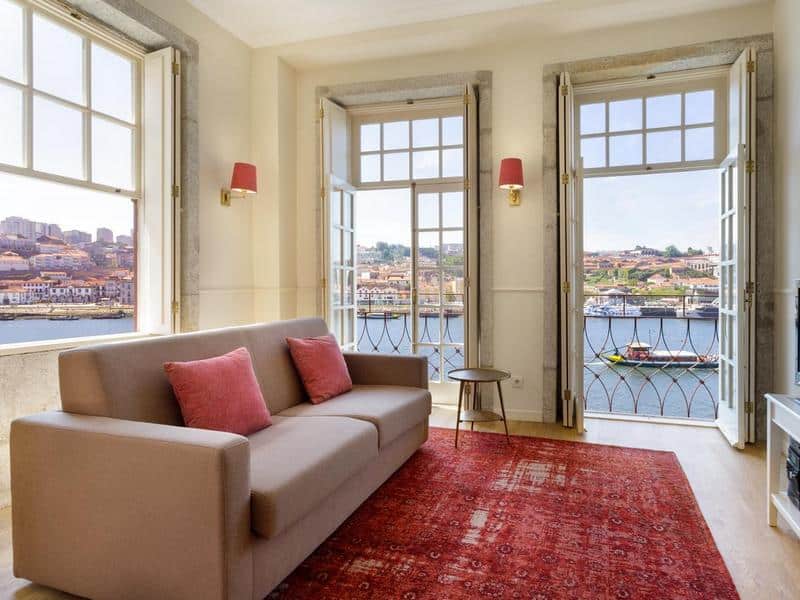
A building from the 18th century that is classified as part of the world heritage site by UNESCO but with all 21st commodities. These modern self-catering apartments exposed stone walls and some feature a balcony with a full view of the Douro River
A more authentic and traditional environment, although with steeper access and a little further away from public transport.
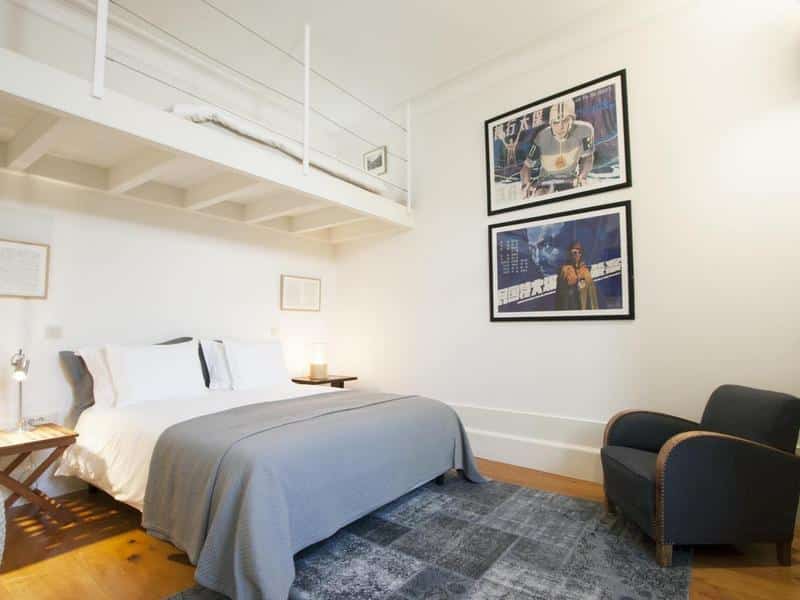
A renovated 19th-century building offering the comfort of a fine hotel with a family atmosphere. The rooms are supremely comfortable and stylish. An outdoor swimming pool is available
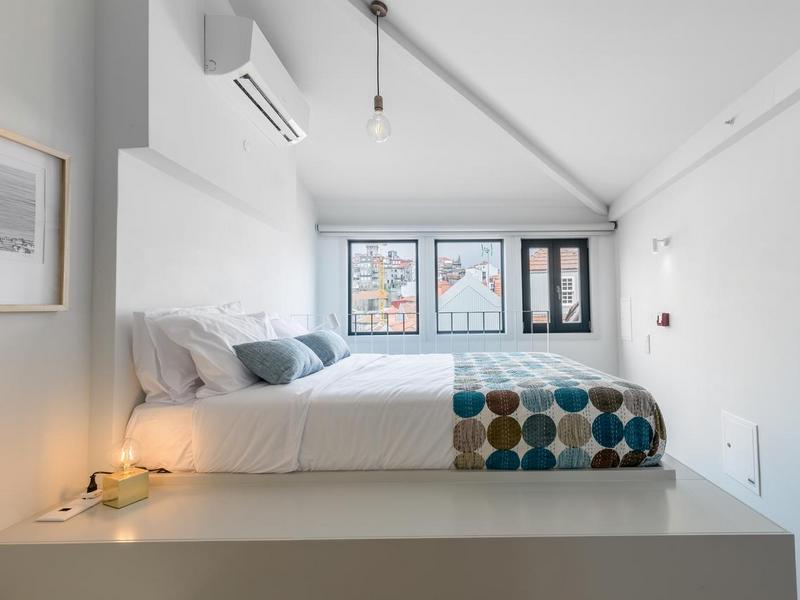
A renovated 19th-century building offering the comfort of a fine hotel with a family atmosphere. The rooms are supremely comfortable and stylish. An outdoor swimming pool is available
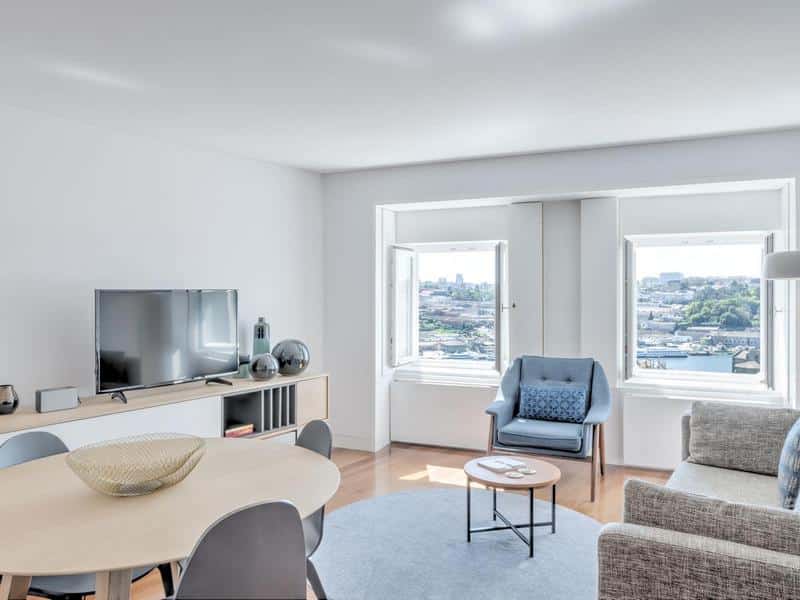
A building with more than 5 centuries of existence with beautiful views of the city. Next to the Cathedral, Rua das Aldas, Porto´s oldest street, is a must stop for the pilgrims who make their way to Santiago de Compostela.
A more residential area, less touristic and with good public transport. Close to Serralves.
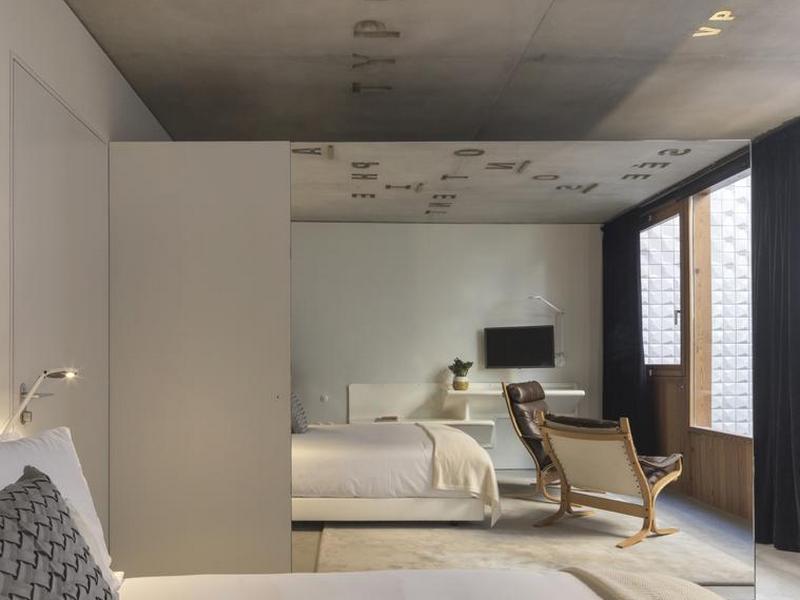
A 19th-century bourgeois house with spacious suites furnished with designer items and period furniture. All 6 rooms have a balcony and city views and the peculiarity of printed texts on the ceiling
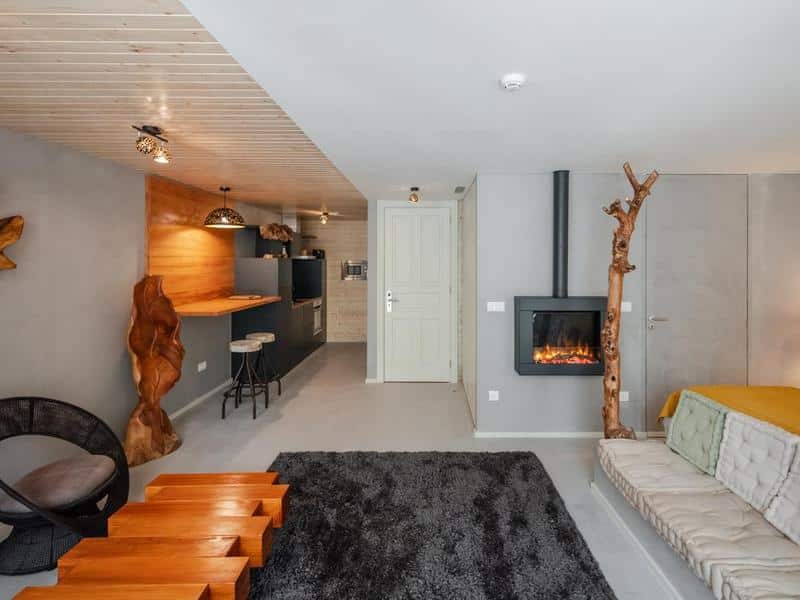
Located between the beach (3km) and the old city centre (3km) Porto Deluxe Apartments are a harmonious blend tradition with contemporary architecture. Offering 7 apartments well equipped for self-catering.
On the other margin of the Douro River, where the Porto wineries are to be found
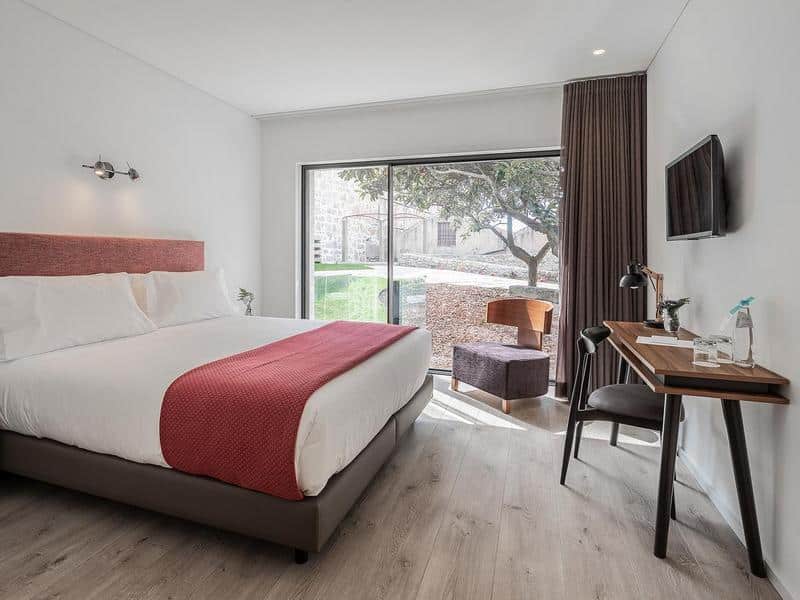
Once the headquarters of the Fiscal Guard, now a hotel of 26 rooms distributed harmoniously over two wings. The old wing houses 8 rooms and the new wing provides 18 rooms with balconies overlooking the greens
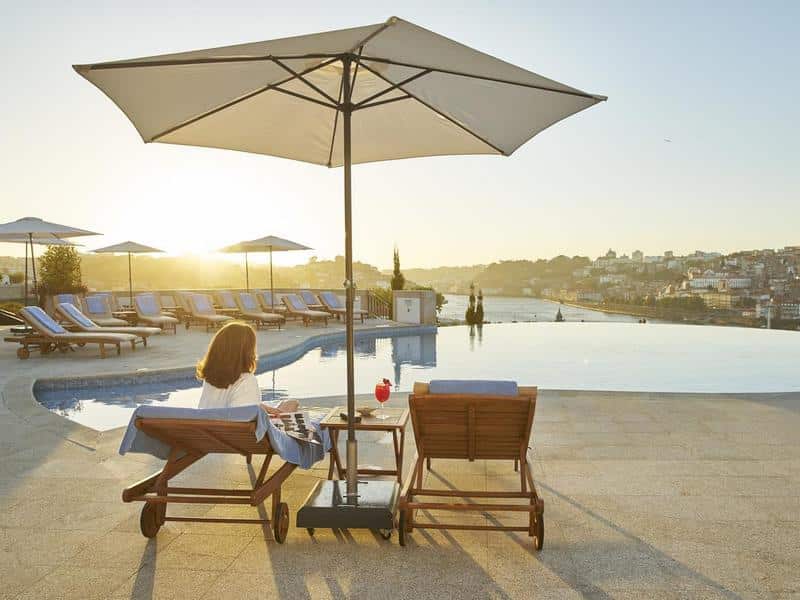
The ex-libris of hotels, where all revolves around wine. From the exquisite decoration, unrivalled panoramic view, ample rooms, indoor and outdoor pool – with sunset parties, spas, gym and a library all make it the prime destination for those wishing to explore the pleasures of the Port and Portuguese wine.
Experience its restaurant with 2 Michelin stars where Traditional Portuguese flavours and regional specialities are expertly paired with the diverse local wine